Turkey attracts millions of tourists from around the world every year with its historical past, rich culture and traditions blended with its surroundings. Besides tourists, many people come to Turkey to live or work for various reasons. Here are 10 things you should know about Turkish Culture that you will definitely encounter during your stay in Turkey.
1. Breakfast Culture
Breakfast is served in every country in the world, but it is very difficult to find a breakfast that fits the Turkish breakfast. In fact, the word “breakfast” is a combination of the words coffee and six. Since Turkish coffee is intense in taste, it cannot be drunk on an empty stomach, you should eat something first.
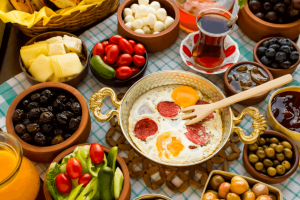
Breakfast Culture
Therefore, the word “breakfast” means “before coffee”. While breakfast is seen as a routine necessity to start the day in most of the world’s countries. Breakfast in Turkey expresses a warm atmosphere that brings family and friends together. Cucumbers, tomatoes, pickled olives, eggs, sausages, assorted cheeses and fresh bread or bagel-like pastries are all on the breakfast table, while no breakfast is complete without freshly brewed tea.
2. Tea
It’s hard to imagine breakfasts, family visits, business meetings, carpet bargains in the Grand Bazaar or ferry rides in Turkish Culture without tea. Be prepared to have a few cups of tea every day when you go to the historical districts of Istanbul or small towns in Turkey.
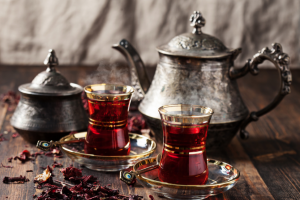
Tea
Tea is a popular drink that wakes up Turks in the morning and brings them together late at night. When asking for tea, it is asked to have rabbit blood and it is consumed with or without sugar according to preference. While visiting a Turkish house, the host offers a freshly prepared cup of tea. This is also done as a display of hospitality and friendship. Generally, a thin-waisted tea glass is used, this glass is used as a unit of measure in recipes. As you pass by the coffee shops on the streets, you can hear the clinking of tiny teaspoons in teacups.
3. Coffee
Turkish coffee, which is produced from very finely ground Arabica beans. Has gained fame all over the world with its strong taste and special preparation and serving methods. Turkish coffee, which is usually consumed after breakfast, also plays a role in marriage traditions. In the past, the groom-to-be evaluated the bride-to-be according to her Turkish coffee making skills during the visit to ask for a girl before marriage.
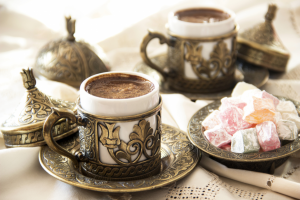
Turkish Culture Coffee
Even today, Turkish coffee is served by the bride-to-be on her maid visit. The coffeehouses where coffee was made and drunk since the 16th century. Were also places where shadow plays such as Karagöz and Hacivat, where the oral culture of the Ottoman Empire spread, were exhibited. Today, coffeehouses are known as a place where men gather to socialize, talk politics and drink tea or coffee, play backgammon and various card games.
4. Evil Eye Beads
It is an eye-shaped blue bead made of glass traditionally used in Turkey. Evil eye means “look”, it is believed to expel evil, and if things are going well, it can help to prevent any negativity that may happen.
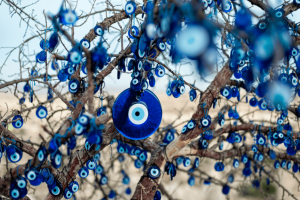
Evil Eye Beads
The evil eye superstition comes from ancient times and is found in most cultures around the world. Wherever you go in Turkey, it is seen that there is an evil eye bead that will protect you from negative energy or the envious glances of others, in a house or car rearview mirror, even in the exhaust pipe.
5. Turkish Bath
Baths dating back to the ancient Romans stand out as places where people socialize as a method of cleaning and relaxation in Turkish tradition. Turkish bath focuses on hot and cold water rather than steam. The human body is rubbed with plenty of soap bubbles, dead skin is exfoliated, and optional body massage is offered, especially in tourist baths.

Turkish Bath
Çemberlitaş Hamam, which was built in 1584 by the famous architect Sinan, is considered a classical hamam. Some scenes of actor Russell Crowe’s movie “The Water Diviner” were shot here.
6. Doner-Kebab
Doner kebab, or doner kebab for short, is known almost all over the world. It is found almost everywhere in Europe today. Of course, the ingredients and sauces are adapted to local habits and tastes.
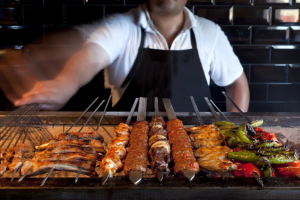
Doner-Kebab
Often under a different name, for example, the Arabs living in Istanbul today call it Shavarma. It is known that the meat used for doner kebab was lamb. Today, in Istanbul, it is sometimes made from a mixture of lamb and beef, but mostly in two types, beef and chicken. Famous Ottoman traveler Evliya Çelebi, who lived in the 17th century, describes kebab as a horizontal piece of meat. Alexander from Bursa in the 1860s
It is known that Efendi serves kebab in a different way by grilling it vertically and serving it in thin slices. It is served as Döner Kebab, Döner Wrap and İskender Kebab.
7. Nasreddin Hodja
Everyone in Turkey, from 7 to 70, has been familiar with Nasreddin Hodja’s jokes and stories since childhood. Although it is known that he lived in Konya, Akşehir in the 13th century, it is known that the stories passed from mouth to mouth from various regions of Turkey and the Balkans, from the Turkish world to Persian, Arab and African cultures, to China and India along the Silk Road, have reached millions of people.
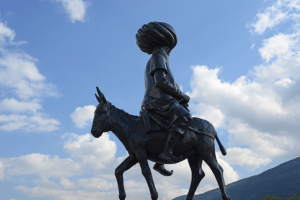
Nasreddin Hodja
A unique and entertaining character in Turkish folklore, Nasreddin Hodja tales mostly contain moral lessons or folk wisdom. He has a good sense of humor and the ability to convey symbolic messages through storytelling, and is also known for his uncanny ability to highlight social issues with the use of humor. The International Nasreddin Hodja Festival is held every year in Turkey between 5-10 July.
8. Oil Wrestling
Oil wrestling, which the Turks call “ancestral sport”, is a type of wrestling with its own rules in which wrestlers are dipped in olive oil. It is almost impossible for the wrestlers to hold each other because they are covered in oil in wrestling.
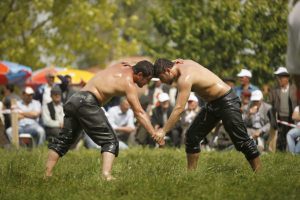
Oil Wrestling
The competition is held in an area called the private field. Competitors wear traditional black costumes and fight to honor a centuries-old tradition with the Kırkpınar Golden Belt and the title of Chief Pehlivan. Today, this national Turkish sport held in Edirne every year is known as the oldest wrestling festival in the world.
9. Turkish Delight
Confectionery, one of Turkey’s most popular exports, has a history of nearly 500 years. Turkish Culture delight, one of the oldest desserts in the world, was traditionally served wrapped in special lace handkerchiefs.
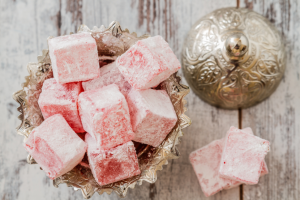
Turkish Delight
The mixture obtained by cooking a mixture of sugar syrup and starch milk for five to six hours is offered in more than 24 varieties, including rose, gum, plain, mint, coffee, walnut, pistachio and hazelnut. The most famous producer of famous Turkish delights, Hacı Bekir sends his delights to customers all over the world.
10. Baklava
The traditional Turkish Culture dessert consumed regularly by many Turkish families is baklava. It is quite popular to bring baklava from Turkey abroad to friends and relatives. It is also indispensable for meetings and Eid celebrations. Gaziantep, the southeastern city of Turkey, is considered the capital of baklava.
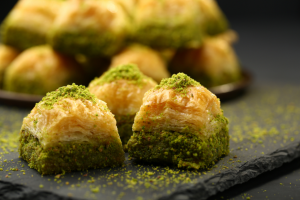
Baklava
Today, Turks buy Baklava from stores, but most people still prefer to have an experienced mother or grandmother make it at home. Baklava, which is an indispensable flavor in the Middle East, is usually made with pistachios in Turkey, while hazelnut is preferred in regions close to the Black Sea.
